Rye Barcott's Blog, page 14
June 12, 2015
We’ve Opened a Computer Lab for Girls in Kibera!
Being a girl in Kibera is tough. The hardships of poverty manifest in difficult ways for girls, leading to issues like early marriage and the pressure to start a family, lack of access to education, and gender-based violence. It’s been proven time and again that strong, educated girls make resilient communities. Giving girls opportunities to empower and better themselves helps everyone.
When it comes to economic concerns, this last statement is especially true. That’s why CFK’s Economic and Entrepreneurship Department is offering another space and activity just for girls: we’ve opened a new computer lab in Kibera! This initiative is the result of a new partnership with Nairobits, an organization based in Nairobi that strives to empower marginalized youth living in slums by offering training in different aspects of multimedia, entrepreneurship, and life skills.
The new CFK-Nairobits Girls Center exists exclusively for girls interested in learning about several multimedia topics, including computer basics, web and graphic design, coding in many different languages, and online research. But the scope of Nairobits’ classes goes further than that. In addition to technological hard skills, girls are taught about entrepreneurship and how it applies to computing. There’s also an emphasis on topics like marketing, both as a concept and as it applies to the girls themselves through their CVs, portfolio, and self-advocacy. Training adolescent girls in these topics helps equip them for economic opportunities in the future by preparing them for their future careers while also fostering in them a sense of creativity and innovation in the field of technology.
CFK aims to mobilize Kiberan girls to attend the center while monitoring and evaluating the program’s progress. Nairobits provides support, training, and guidance for students who choose to enroll. Volunteers from CFK have attended classes at Nairobits before with incredible success. Through this new arrangement—and based on positive interaction in the past—we are reaching many more girls so they can build professional skills, creativity, and confidence in the intersecting worlds of technology and entrepreneurship.
June 11, 2015
Watch The CFK Sprinters in Action on Kenya Citizen TV!
Have you ever wanted to see CFK’s jump rope team, the CFK Sprinters, in action? Now you can! Continuing their news streak, the Sprinters were recently the highlight of one of Kenya’s popular morning shows on Kenya Citizen TV. The clip, which lasts almost half an hour, shows impressive routines performed by the team and interviews with Coach Innocent Philip about jump rope’s new status as an official sport in Kenya. The anchors even get ready to jump at one point…needless to say, it’s an entertaining assortment of things all about CFK’s jump rope program.
Check it out below!
June 4, 2015
An Athlete’s Focus: Seline’s Journey from Jump Roper to Straight-A Student
By: Jeffrey Okoro, Education Program Officer
–
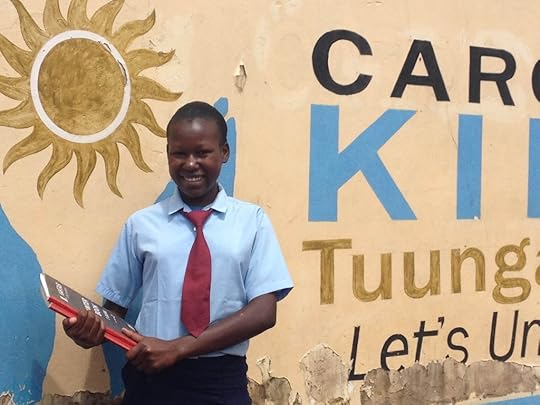 When first meeting Seline Anyango, CFK scholarship recipient, it is obvious that she is very diligent and serious about her studies. But there is certainly more to Seline, including a sharp wit, an athlete’s focus, and plenty of confidence.
When first meeting Seline Anyango, CFK scholarship recipient, it is obvious that she is very diligent and serious about her studies. But there is certainly more to Seline, including a sharp wit, an athlete’s focus, and plenty of confidence.
Seline, who was born and grew up in Kibera’s Gatwekera village, took her first step on the path to earning a CFK scholarship by joining the Sports Association—specifically the jump rope team, The CFK Sprinters, of which she’s still an active member. She learned about the team while she was in elementary school. After watching impromptu street performances (what the CFK Sprinters call “Road Shows”), she decided to try out for the team at the age of 12 when she was in 7th grade. Jumping with the team helped her learn vital lessons about teamwork and friendship, but also opened the door to many youth-led workshops on self-esteem, life skills, and the importance of staying in school.
This last topic hit home for Seline, who at the time was having trouble paying school fees. While her family supported her decision to keep studying, the financial strain of sending multiple children to school proved to be too much. She was told she would have to wait until her older siblings graduated. So, Seline set out in search of opportunities. She was referred to CFK’s Education Program by a friend on the team. Shortly thereafter, she decided to apply. At the end of the cycle, she received great news—she was being awarded a 3-year scholarship from CFK!
I managed to meet Seline at CFK’s office right before she embarked on the journey back to Machakos, a town in Kenya’s Eastern Province about an hour and a half away from Nairobi, where she attends St. Valentine High School. Now 16 years old, she is currently in 11th grade and in the third year of her scholarship. Dressed in her blue blouse, red tie and dark blue dress, she could be easily mistaken for an officer from the Kenya Ministry of Health, as they dress very similarly. Perhaps this is intentional, since Seline intends to go into medicine. “I want to be a nurse,” she says, warmly, “because I admire the care they provide others.” With a smile, she adds, “Plus, it’s nice that they are always smartly dressed.”
What makes the highly confident 16-year-old outstanding is her ability to be both a top performer at school, maintaining an A- average in her studies, while also staying committed to the CFK Sprinters. Unlike many teenagers who would pick celebrities as their role models, Seline describes her jump rope coach, David, as a positive and determined mentor. “The lessons I’ve learned from jump rope and my coaches like self-discipline, consistency, and hard work have helped me in my studies—and my life,” she says, proudly. When asked about the secret to her success, she cleverly taps her plastic watch, meaning the skill of time management.
Seline has big dreams. She wants to graduate from high school with top marks and start working to become a nurse. She wants to help take care of her family. She also shares some more casual but no less ambitious dreams, including a desire to travel to Switzerland to eat as much chocolate as possible. With her determination, wit, and ambition, she’ll surely make all her dreams a reality.
May 15, 2015
Emergency in Kibera: Help Us Stop the Cholera Outbreak!
![Cholera 1 [re-size]](https://i.gr-assets.com/images/S/compressed.photo.goodreads.com/hostedimages/1431843511i/14875111._SY540_.jpg) Friends, we need your help!
Friends, we need your help!Currently, there is a severe outbreak of cholera in Kibera, with more and more cases surfacing throughout the community. There have been dozens of confirmed cases, with 5 resulting in death—and the number keeps climbing. Without intervention, it will only get worse.
Carolina for Kibera is working hard to treat patients who have contracted cholera and continue educating the community on good hygiene practices. But we can’t do it alone! Your support is crucial to helping us stop this outbreak. Donate today.
What is cholera?
Cholera is a water-borne, diarrheal disease that is extremely virulent and can be fatal if left untreated. While not contagious, improper environmental sanitation, such as the open sewers and poor drinking water found in Kibera, can lead to contamination of food and water on a large scale. Currently, Kenya is in its rainy season, which only makes it worse. There is no way to tell if food or water is contaminated. As a result, the government has banned eating raw food and closed businesses selling food and water in Kibera.
How is CFK helping?
The good news is that the majority of cholera cases are treatable—if they are caught early enough. Up to 80% of people can be treated successfully through oral rehydration salts (info via the World Health Organization). Carolina for Kibera is working hard to provide care for the influx of cholera cases at 2 different treatment centers, one of which has been set up in our clinic. The Kenyan government relies on local partners to help respond to outbreaks like this one; therefore, CFK’s services are vital for the community. For prevention, Community Health Volunteers are reaching out to members of the community with important hygiene and sanitation tips, especially regarding hand-washing and water purification.
How can I help?
Cholera control programs are expensive because efforts to stop an outbreak take place over several months. As such, your support through this outbreak can make a huge difference. Your donation will go to procuring vital materials, including:
stand-alone hand-washing facilities
soap
water treatment kits
oral rehydration salts to treat patients who have contracted the disease
education and communication materials
Providing these supplies will reduce the number of cases of cholera, ensure we are prepared if the situation worsens, and prevent future outbreaks.
With your help, we can turn the tide. Donate today.
Energency in Kibera: Help Us Stop the Cholera Outbreak!
![Cholera 1 [re-size]](https://i.gr-assets.com/images/S/compressed.photo.goodreads.com/hostedimages/1431843511i/14875111._SY540_.jpg) Friends, we need your help!
Friends, we need your help!Currently, there is a severe outbreak of cholera in Kibera, with more and more cases surfacing throughout the community. There have been dozens of confirmed cases, with 5 resulting in death—and the number keeps climbing. Without intervention, it will only get worse.
Carolina for Kibera is working hard to treat patients who have contracted cholera and continue educating the community on good hygiene practices. But we can’t do it alone! Your support is crucial to helping us stop this outbreak. Donate today.
What is cholera?
Cholera is a water-borne, diarrheal disease that is extremely virulent and can be fatal if left untreated. While not contagious, improper environmental sanitation, such as the open sewers and poor drinking water found in Kibera, can lead to contamination of food and water on a large scale. Currently, Kenya is in its rainy season, which only makes it worse. There is no way to tell if food or water is contaminated. As a result, the government has banned eating raw food and closed businesses selling food and water in Kibera.
How is CFK helping?
The good news is that the majority of cholera cases are treatable—if they are caught early enough. Up to 80% of people can be treated successfully through oral rehydration salts (info via the World Health Organization). Carolina for Kibera is working hard to provide care for the influx of cholera cases at 2 different treatment centers, one of which has been set up in our clinic. The Kenyan government relies on local partners to help respond to outbreaks like this one; therefore, CFK’s services are vital for the community. For prevention, Community Health Volunteers are reaching out to members of the community with important hygiene and sanitation tips, especially regarding hand-washing and water purification.
How can I help?
Cholera control programs are expensive because efforts to stop an outbreak take place over several months. As such, your support through this outbreak can make a huge difference. Your donation will go to procuring vital materials, including:
stand-alone hand-washing facilities
soap
water treatment kits
oral rehydration salts to treat patients who have contracted the disease
education and communication materials
Providing these supplies will reduce the number of cases of cholera, ensure we are prepared if the situation worsens, and prevent future outbreaks.
With your help, we can turn the tide. Donate today.
May 13, 2015
Meet New CFK-Kenya Board Member, Karen Austrian
By: Nick Johnson, Communications and Fellowship Program Coordinator
–
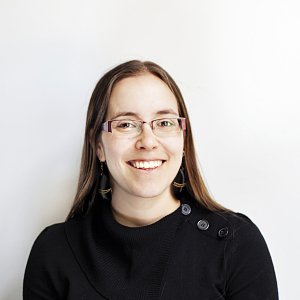 Karen Austrian is no stranger to Carolina for Kibera. As the co-founder of its Daughters United program (Binti Pamoja), she has been involved with CFK since its inception. Now, after several years away from the organization developing an extensive portfolio of evidence-based public health research, she has returned to CFK as a member of CFK-Kenya’s Board of Trustees.
Karen Austrian is no stranger to Carolina for Kibera. As the co-founder of its Daughters United program (Binti Pamoja), she has been involved with CFK since its inception. Now, after several years away from the organization developing an extensive portfolio of evidence-based public health research, she has returned to CFK as a member of CFK-Kenya’s Board of Trustees.
Karen first traveled to Kenya to spend her junior year of college abroad. Upon graduation, she wanted to return to lead a photography project involving adolescent girls. With a short time-frame of a 3-month travel grant, it made sense to look for local organizations with whom to partner. That’s when she found Salim, Rye, and Tabitha—while CFK was still in its infancy. “We used to joke that CFK was an organization that lived in a backpack,” she says. “It’s amazing to see how an organization that lived in cyber-cafes and empty school classrooms has become such a permanent presence in the community.” At that point, CFK had just launched a soccer program for girls, so a partnership with Karen was a welcome addition.
Thus, the foundation for Daughters United was built. Over the years, it became more established, with leadership being transitioned to Kenyan women. Meanwhile, Karen came back to the U.S. after two years to attend graduate school, where she earned a Masters in Public Health from Columbia University. As if getting a degree wasn’t enough work, she also began working for Population Council as a consultant. Population Council is a worldwide research organization that generates and uses data to push for change in 3 thematic areas: HIV and AIDS; reproductive health; and poverty, gender, and youth. After earning her degree, she began working for them full time. Her primary project? Fittingly, she served as the Principal Investigator of a study looking at the effects of combining Safe Spaces and access to savings accounts for adolescent girls in Kenya and Uganda.
While working at Population Council, Karen also completed a Ph.D. in Public Health and Epidemiology at Ben Gurion University. Now, as Dr. Austrian, she leads Population Council’s Poverty, Gender, and Youth Program in East Africa. She currently serves as principal investigator on 3 studies in Kenya and Zambia, all of which focus on the empowerment of adolescent girls. (You can check them out here, here, and here.) One of Population Council’s guiding principles is its commitment to evidence-based programming, using thorough research to push for change. “In order to conduct responsible research,” Karen explains, “you cannot just stop with the results. You have to use the results to then design effective, evidence-based programs and to advocate for policy and funding changes.” Her expertise using research to inform how programs are built will prove vital to CFK, as the organization makes strides to focus its efforts on monitoring and evaluation of programs.
While Karen stayed involved with Daughters United as an advisor, she was astounded by how much Daughters United had grown. “Sometimes, I would visit and realize that I didn’t know any of the girls in the program,” she recalls. “To me, that is a real sign of success. Binti Pamoja had taken off and grown.” Daughters United—like the rest of CFK—grew and continued to gain standing within the community of Kibera as a safe place. Karen has witnessed the extent of this, based on an experience she had shortly after the post-election violence of 2008. “Everything around the CFK office was burnt or destroyed,” she says, “but the office itself was left untouched.” That image has resonated with her as a testament to CFK’s influence in the community since.
When asked why she decided to return to CFK, Karen emphasized that after taking time away from the organization, it seems fitting to return. With her extensive experience with evidence-based research through her impressive academic background and work with Population Council, she is excited to serve as a resource for CFK as it continues to grow. “CFK is at somewhat of a turning point, and everyone is committed to seeing new, refreshing ideas come through.” With Karen’s experience and the leadership of her and her fellow board members, there is no doubt that CFK will embrace its potential and see its goals and vision for the community come to fruition.
Inveneo Donates 100 Tablets to CFK’s Health Department
By: Nick Johnson, Communications and Fellowship Program Coordinator
–
![Inveneo Tablets [re-size]](https://i.gr-assets.com/images/S/compressed.photo.goodreads.com/hostedimages/1433501176i/15103481._SY540_.jpg) Carolina for Kibera’s data collection methods are getting an upgrade! Earlier this week, 100 new Google Nexus 7 tablets arrived at CFK’s U.S. office in Chapel Hill. The donation came by way of Inveneo, a technology non-profit that seeks to deliver technological tools to people who need them most in the developing world.
Carolina for Kibera’s data collection methods are getting an upgrade! Earlier this week, 100 new Google Nexus 7 tablets arrived at CFK’s U.S. office in Chapel Hill. The donation came by way of Inveneo, a technology non-profit that seeks to deliver technological tools to people who need them most in the developing world.
So what could we possibly do with 100 sleek, shiny new tablets? These tablets will be used by Community Health Volunteers to more accurately collect health data from thousands of families in Kibera! With more standardized and thorough data, CFK can better assess the community’s need for health services and outreach. A more complete picture of what the community needs will also help us evaluate the success of existing programs and pinpoint areas of improvement.
Thank you, Inveneo! With this donation, you’ve certainly advanced your mission and ours—to help people lead healthy, safe, and self-sufficient lives.
Friendly Competition: The CFK Sprinters Compete Amongst Themselves
By: Kennedy Juma, Sports Association Program Officer
–
Over the past couple of years, you’ve heard all about the CFK Sprinters’ competitions in Kenya, East Africa, and the U.S. But the Sprinters don’t stop there—to challenge and motivate each other, they even hold competitions amongst themselves from time to time! Organized a couple of times a year, these in-house tournaments give jumpers a chance to engage in friendly competition with their peers. Even more importantly, the in-house competitions monitor and grade the jumpers, and help seasoned athletes as well as rookies understand the rules and regulations of the jump rope sport.
The Sprinters’ most recent in-house competition, held on the first of May, brought together 65 jumpers from the team. We had a massive turn-out from the community, with residents crowding around to watch the live performance. Perhaps this isn’t surprising, since it was the last day before school would start up again after a long vacation. This made it even sweeter for athletes who attend boarding school in other parts of Kenya—the tournament served as a nice send-off for them, with the rest of the team bidding them farewell until the next school holiday in August.
Like all tournaments, the in-house competition seeks to give jumpers a chance to compete and challenge their peers to work hard and improve. As such, the coaches give out several medals for the best performers, which encourages and motivates every jumper to work hard and give it their all. However, because it’s just Carolina for Kibera competing, it gives the coaches some time to work one-on-one with jumpers in a low-pressure environment.
The tournament also featured an educational component. Jump rope is still a relatively new arrival in Kenya, and Kibera specifically. Many members of the community do not know the rules of jump rope (and some do not believe it is a real sport), or how the power of sport can be harnessed to teach kids about confidence, healthy habits in their daily lives, friendship, and teamwork. Children who came to watch got a chance to dance alongside the jumpers and, if they were old enough, to practice their moves with a rope. By encouraging children from the community to try out jump rope through competitions like these, Carolina for Kibera can reach more at-risk youth in the community with messages of peace, health, and self-esteem. Who knows? If given the opportunity, they could turn out to be world-class athletes one day.
May 4, 2015
After Graduation, Baraza Goes After His Dream
By: Scott Weathers, CFK Intern, American University
—
 CFK Education Program Officer, Jeffrey Okoro, and I approach the imposing structure of Equity Bank, which juts into the Kibera sky between the tin roofs of vegetable stands and metal shops. It’s an odd site—Kenya is known for the popular practice of “tabletop banking,” where people save money through informal groups and take loans from within their social networks—but the chain has expanded its services to Kibera residents. Inside, we speak to the student we’re looking for: Baraza Juma, CFK scholarship recipient and recent high school graduate.
CFK Education Program Officer, Jeffrey Okoro, and I approach the imposing structure of Equity Bank, which juts into the Kibera sky between the tin roofs of vegetable stands and metal shops. It’s an odd site—Kenya is known for the popular practice of “tabletop banking,” where people save money through informal groups and take loans from within their social networks—but the chain has expanded its services to Kibera residents. Inside, we speak to the student we’re looking for: Baraza Juma, CFK scholarship recipient and recent high school graduate.
Though it’s only been two days since he started his job at Equity Bank, Baraza looks confident and comfortable in a pressed shirt and tie. The youngest face working at the bank by far, Baraza explains that his excellent test scores at the end of high school helped him get the impressive job. Two recent graduates—out of thousands of applicants—from Baraza’s school district are selected each year to work for Equity Bank. Baraza’s success in high school wasn’t solely defined by test scores, however; he also participated in numerous extracurricular activities at his boarding school. His positions as Dorm Captain, Societies Captain, and Class Captain (leadership positions similar to Student Government in U.S. high schools) led to his nickname, “The President,” which he recalls with a wry smile.
Despite his experience in his school’s leadership, Baraza isn’t interested in holding political office. “I have wanted to work in medicine for as long as I can remember,” he explains. Baraza dreams of attending medical school at Moi University, and after that, opening a pharmacy to provide medical treatment to Kenyans from all walks of life, especially those in Kibera. He is waiting to hear back from Moi University, which he hopes to attend in September.
When asked how the scholarship he earned from CFK’s Education Program affected him, Baraza replied, “I had a peaceful time in school. I never saw an invoice, I was just in school.” He described never having to “chase money,” a phrase used by students who have a hard time paying school fees to describe the seemingly never-ending process of finding funds. A scholarship from CFK’s Education Program meant he and his family didn’t have to worry about that, giving him the freedom to pursue his studies uninterrupted by fee troubles, and allowing him the mental space to focus on academics.
Baraza’s story reinforces CFK’s central belief that talent is universal, but opportunity is not. Helping connect bright students like Baraza to life-changing opportunities depends on several factors sometimes outside of one’s control—getting a job offer, being accepted to university, etc.—but making a difference doesn’t have to be complicated. It can start with a simple act of great impact, like providing a high school scholarship for a promising young student.
April 30, 2015
Grabbing the Opportunity: Maurine Atieno Opiyo
By: Stella Sigana, Head of CFK’s Economic and Entrepreneurship Department
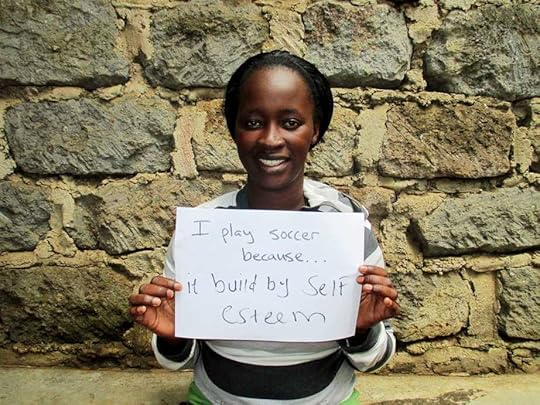
Maurine participating in the 2014 Kick for Kibera Cultural Exchange Photo Project.
Maurine learned early on that when a good opportunity presents itself, you ought to take it. Now one of the first members of CFK’s new Work Readiness Program to find steady, formal employment, she is encouraging other young people to take advantage of rising opportunities in the community.
So how did she get started with CFK? A friend of hers thought she would be interested in joining Daughters United (Binti Pamoja), CFK’s girls’ program that seeks to provide adolescent girls with a space in which to express themselves creatively, learn about and discuss issues they face in the community, and build practical and artistic skills. When Maurine heard about CFK in 2005, she was 16 and had lived in Kibera since she was 4. Married with one child, she had heard of many organizations serving the Kibera community, but didn’t know how she would find the time to get involved. Despite this, her friend encouraged her to join, emphasizing how important it was for herself and for her community. Following her friend’s advice, Maurine went ahead and applied to join the program and was accepted.
While in Daughters United, Maurine was very determined and ready to learn. After 2 years of participating in the program, her commitment to the group’s activities was evident. As a result, the leaders chose her to be the program’s Field Event Planner! Maurine performed brilliantly in her new role, always meeting deadlines on time and naturally connecting socially with girls in the program. She also became very involved in CFK’s Sports Association, leading workshops for teams of both boys and girls.
Over the years, Maurine became very plugged in to CFK’s network of programs. When the Economic and Entrepreneurship Department announced the launch of the Work Readiness Program to help young people in Kibera prepare for and locate formal work opportunities, Maurine didn’t hesitate and applied right away. Upon demonstrating her accomplishments through Daughters United, it was clear that Maurine was a great candidate for the program and she was selected to be part of the pilot group!
The first cohort of participants in the Work Readiness Program at the program’s launch.
The Work Readiness Program seeks to equip determined young Kiberans interested in formal sector jobs with the skills and training necessary for work in those fields. Activities include trainings on topics like office skills and resume writing. The program also helps prospective job candidates finish certificate or diploma courses that provide technical training in specific industries. For example, Maurine is a proud holder of a high school diploma, something she earned after saving money for years. An astute student, she wanted to continue her education through a certificate course in social development but found that she was unable to afford the matriculation fees. The Work Readiness program, seeing the value in this kind of certification, stepped in to help.
And the investment paid off: upon completing her course in December 2014, she has secured employment with Elvees Electrical Limited, a company that supplies electrical equipment and installation services for computer centers. Maurine works in their customer service division, which means she gets to put her people skills she gained from leading Daughters United trainings to use!
Because of Maurine’s eagerness to grasp good opportunities that come her way, she is now proudly earning a steady income. She has promised to begin saving in order to continue her education, which will help her empower her family and her community to ensure others have access to vital knowledge and skills. Maurine envisions a poverty-free society where everybody can find opportunities to help them and their families live prosperously. With her determination, she’s already well on her way.
Rye Barcott's Blog
- Rye Barcott's profile
- 7 followers



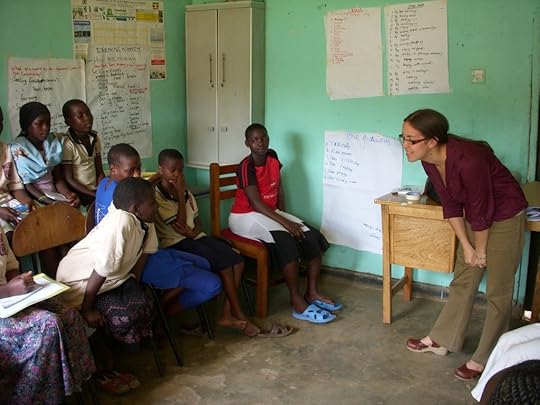
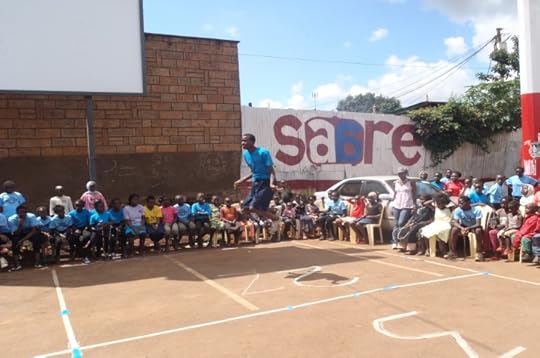
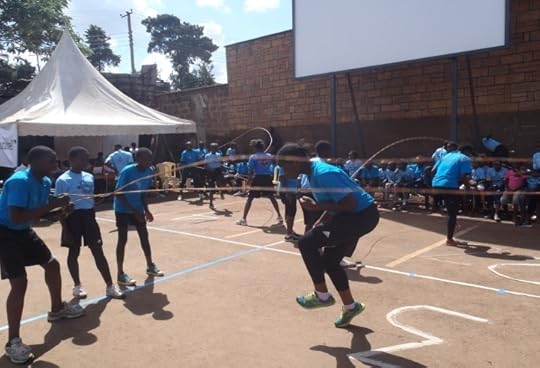
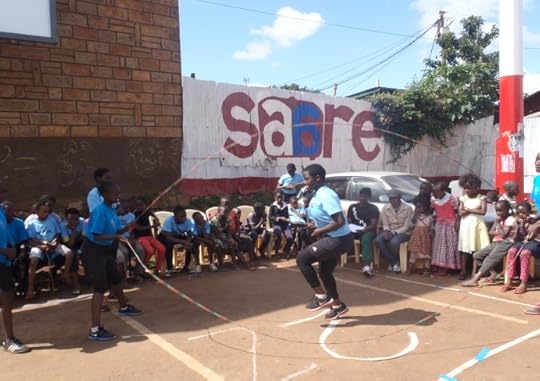
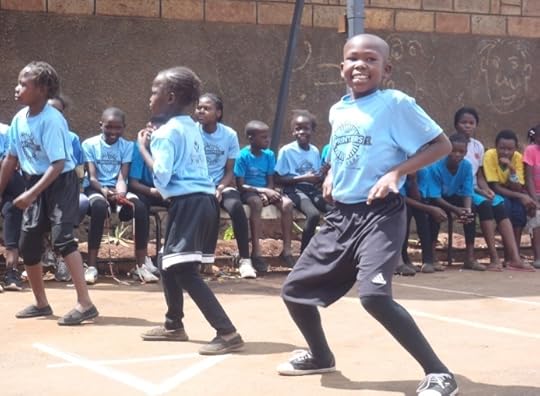
![Work Readiness Launch [slide size]](https://i.gr-assets.com/images/S/compressed.photo.goodreads.com/hostedimages/1430416716i/14711758._SX540_.jpg)

